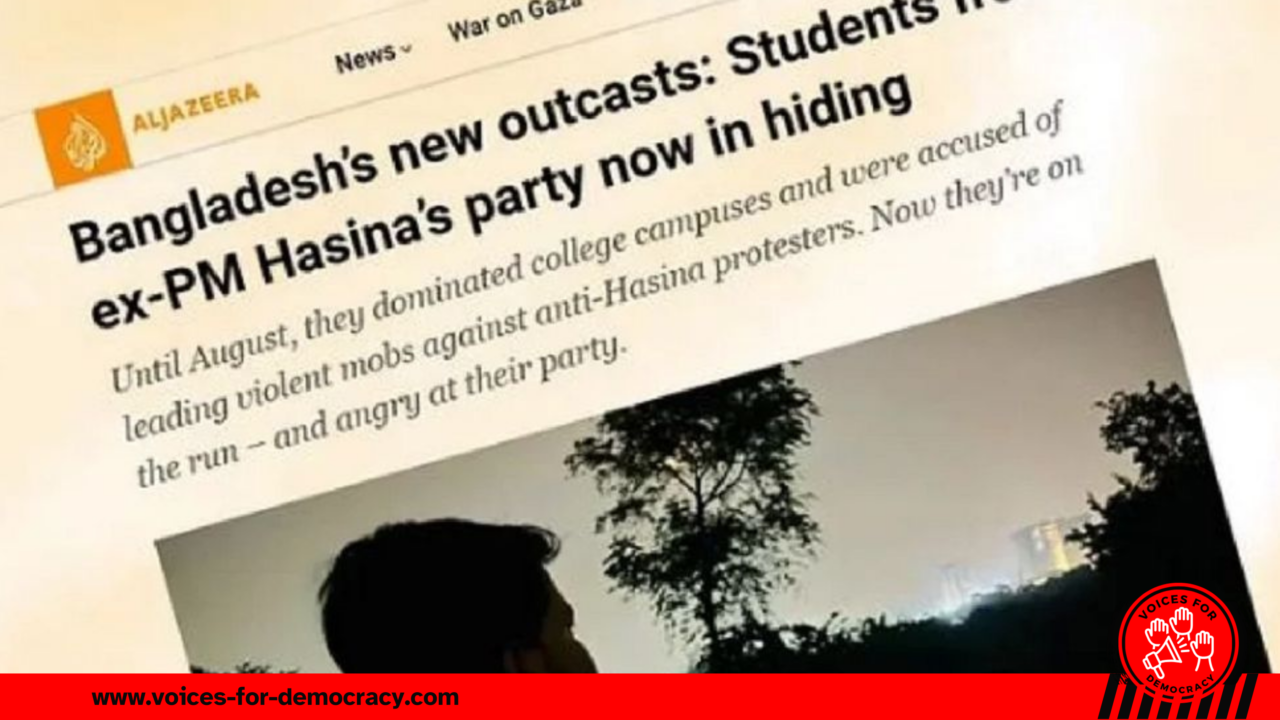
A former leader of the now-banned Bangladesh Chhatra League (BCL) at Dhaka University revealed to Al Jazeera that he is “running like a fugitive” after the fall of the Awami League government and the outlawing of the student organization. He expressed disillusionment, saying he sees no future ahead and that the party abandoned them when they needed it the most.
Al Jazeera published the report on Sunday, October 27, following the recent ban on Chhatra League by Bangladesh’s interim government, which declared the organization a “terrorist group.” According to the Home Ministry, BCL has a history of violence, harassment, and misappropriation of public resources over the last 15 years.
The leader, whose identity was protected with the pseudonym “Fahmi,” was a 24-year-old student of Applied Chemistry at Dhaka University. Once a powerful figure on campus, Fahmi has been in hiding since early August, after a student-led movement forced the Awami League out of power. Prime Minister Sheikh Hasina, the long-time leader of the Awami League, fled to neighboring India amid the unrest.
The Fall of Chhatra League and Its Leaders
The report highlights that the lives of many students associated with Chhatra League have collapsed overnight. Formerly powerful on university campuses and used as the muscle for Awami League, these students are now facing evictions, threats of retaliation, and potential imprisonment.
Fahmi disclosed that his family’s home and cold storage business in Noakhali were set on fire by protesters. He also reported receiving threats that his younger brother would be “disappeared” if his whereabouts were revealed.
Reflecting on his past, Fahmi admitted that being a leader in Chhatra League had boosted his chances of securing a government job. However, his loyalty to the party came at a personal cost. “I prioritized the party over my family, and now, when I need support the most, I find myself abandoned,” he lamented.
Betrayal and Disillusionment
Fahmi shared his frustration with Al Jazeera, saying, “I gave salutes to our leaders and spent hours organizing rallies. But today, all of it feels meaningless.” He expressed bitterness over the Awami League’s abandonment, emphasizing that their involvement in the party’s activities had left them vulnerable to public anger after the government’s downfall.
Although he did not participate in the crackdown against anti-Hasina protests, he said that his sisters joined the demonstrations, and he personally believed the demands were just. However, as a party member, he felt trapped by organizational obligations.
Fahmi also criticized the top leadership of Chhatra League and Awami League, stating, “When the government fell, it was one of the hardest moments of my life to escape from the mob. Yet, none of the top leaders contacted me.”
A Bleak Future Ahead
Now fearing arrest or worse if he returns to campus, Fahmi expressed his fear that, under fabricated allegations, he could either be detained or even killed. “I wanted to serve my nation through a government job, but stepping back onto campus could lead to my death,” he said.
Al Jazeera’s report indicates that Fahmi’s predicament is not unique. According to the Awami League’s estimates, at least 50,000 students across the country with party affiliations are now struggling to continue their education amid uncertain futures.
The report paints a grim picture of these students, once influential figures on campus, who now face the harsh consequences of their former alignment with a regime accused of human rights abuses during Sheikh Hasina’s tenure.
In closing, Fahmi expressed deep regret over his involvement, saying, “The party used us as political pawns. But when we needed protection, it offered none. Now, with Hasina safe in India, we are left to suffer the consequences.”
Source: Link
